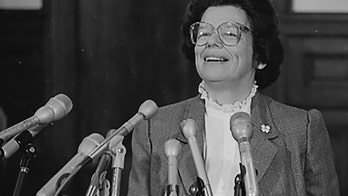Many federal government jobs will remain unfilled despite President Trump’s plans to lift the hiring freeze Wednesday, Budget Director Mick Mulvaney said.
Mulvaney told reporters Tuesday that the move was part of the president’s campaign to “drain the swamp” in Washington and save taxpayers money. The White House hopes to overhaul the executive branch and reduce its work force.
"It does not mean that the agencies will be free to hire willy-nilly," Mulvaney said. "What we're doing tomorrow is replacing the across-the-board hiring freeze that we put into place on Day One in office and replacing it with a smarter plan, a more strategic plan, a more surgical plan."
Trump signed a memorandum in January freezing large portions of federal government hiring, barring the military and positions deemed necessary for national security and public safety. As part of the memorandum, Trump gave the Office of Management and Budget 90 days to come up with a long-term plan to reduce the federal government's size.
While the guidance to be issued Wednesday does not contain agency-specific hiring goals or limits, Mulvaney said that agencies targeted with significant budget cuts in Trump's first budget proposal, such as the Environmental Protection Agency, would be expected to make significant cuts to their workforces.
Agencies that Trump wants to spend more on, like the Department of Veterans Affairs, would be expected to see their payrolls rise.The budget blueprint calls for a 6 percent increase in VA funding, mostly to pay for rising health costs to treat veterans.
Mulvaney declined to say how many jobs, overall, the administration intends to eliminate, but said: "I think it probably goes without saying that net, we think we could run the government more efficiently than the previously administration."
Under the guidance, agencies will also have until June to submit drafts for overhauling their workforces and coming up with ideas for streamlining operations as part of a larger effort to restructure the federal government. The administration is surveying the public, academics, lawmakers and others for ideas such as potentially moving the National Nuclear Security Administration to the Department of Defense from the Department of Energy, where it currently resides.
"The president of the United States has asked all of in the executive branch to start from scratch," Mulvaney said. He acknowledged that many such changes would require congressional sign-off.
"We're not trying to ram it down their throats," he said.
The Associated Press contributed to this report.




